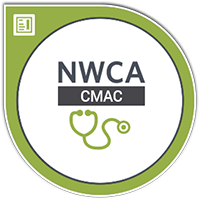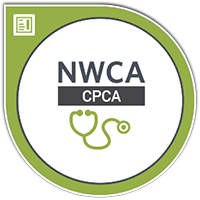Career Training
Self-Paced, Online
Ongoing Enrollment
4 to 6 months
Continous
Course Description
PROFESSIONALISM IN ALLIED HEALTH
This course will benefit anyone considering a career in allied health, as well as those already working in the field. Allied Health Professionals must be committed to the key attributes of professionalism and strive to reflect this within the delivery of patient-centered safe and effective care. "Professionalism" is a broad term that reflects many different skills and abilities. For an individual to exhibit professionalism, he/she must be armed with specific skills and abilities that do not always show up within certification requirements, or even within a career training curriculum. Soft skills are hard to measure and are typically less well-defined than hard skills. However, soft skills are what set many job candidates apart. Professionalism is not just what one knows, it is how one does their job, how one behaves and how one comes across as they interact with others.
The purpose of this course is to provide students with soft skills training that will provide the tools needed to demonstrate a higher level of professionalism on the job. Key components of the course focus on patient interaction, proper office behavior, medical ethics, diversity and cultural bias, emotional strength, professional appearance and communication. The course maintains a focus on the key attributes that are true markers of professionalism.
This course was created with input from healthcare professionals working in the field, healthcare employers that hire our graduates, professional educators and even former MedCerts students. The end result is a collection of modules that touch on the soft skills that are TRULY important in the real world of allied healthcare. In this course, students are engaged through scenario-based learning that allows for real interaction with virtual co-workers and patients. Additionally, game-based activities keep students engaged and entertained throughout their learning journey.
INTRODUCTION TO HUMAN ANATOMY AND MEDICAL TERMINOLOGY
This course is designed to familiarize the student with the language of medicine, through the study of prefixes, suffixes, root words, abbreviation, and pronunciation of words. The curriculum also includes an anatomy and physiology app that enables students to explore, visualize, interact, and experience the anatomy of the human body in 3D and augmented reality (AR). Students will examine the organization of the integumentary, musculoskeletal, hematic, lymphatic and immune, and cardiovascular systems in the human body. They will become familiar with the medical terms that relate to the respiratory, digestive, nervous, endocrine, reproductive, and excretory systems. Students will also examine terms related to the sensory organs, with a concentration on the organs for hearing, sight, and smell. This immersive experience will trigger thought processes and enhance learning outcomes in their Anatomy and Physiology program. The app has about 50 simulations across different topics.
PHLEBOTOMY
Phlebotomy is a comprehensive course with insight and focus on specimen collection for diagnostic testing in the healthcare facility, providing foundational knowledge required of an allied healthcare professional. Video-based lessons include fundamentals of phlebotomy with emphasis on infection control, safety, communication skills, patient care and preparation, venipuncture equipment and supplies, specimen collection, handling, transport and processing.
In this course, students are exposed to a variety of eLearning elements that allow for hands-on interaction with the screen for an engaging education. Simulations will provide the student opportunities to practice key phlebotomy skills performed in a medical facility. In addition to video- based instruction and simulation, a variety of other learning methods are utilized for engagement, entertainment and inspiration throughout training.
ELECTROCARDIOGRAPHY
Electrocardiography is a comprehensive course with insight and focus on diagnostic cardiac testing in the healthcare facility, providing foundational knowledge required of an allied healthcare professional. Video-based lessons include the fundamentals of electrocardiogram performance, Holter monitor application and assistance with stress testing. An emphasis is placed on cardiac arrhythmias. Patient care, preparation and monitoring are addressed along with standard precautions and the Occupational Safety and Health Administration (OSHA).
In this course, students are exposed to a variety of eLearning elements that allow for hands-on interaction with the screen for an engaging education. Simulations will provide the student opportunities to practice key electrocardiography skills performed in a medical facility. In addition to video-based instruction and simulation, a variety of other learning methods are utilized for engagement, entertainment and inspiration throughout the training.
FUNDAMENTALS OF PATIENT CARE
Fundamentals of Patient Care is a comprehensive course that focuses on the current and evolving role of patient care in the healthcare setting. Video-based lessons include fundamentals of patient care, compliance and safety, professional responsibility, infection control, basic emergency care, patient assessment and vital signs, and grooming/hygiene. Topics related to specific patient-types are also be addressed, including caring for older adults, pediatric, and special needs patients. The course also details the importance of teamwork in the healthcare environment and breaks down the various roles that professionals fill as it relates to patient care whether through supporting chronic conditions, emergency, or end-of-life care.

Learning Objectives
- Gain an understanding of the expectations of an allied healthcare professional in the workplace
- Develop and exercise emotional intelligence, self-management and interpersonal skills
- Build and improve internal and external communication skills with all exchanges
- Enhance the patient care experience with successful interactions and patient satisfaction
- Maintain solution-oriented conversations, manage conflict and build self-confidence
- Recognize the importance of infection control and safety compliance with diagnostic testing
- Understand the responsibilities of teamwork and communication skills in the healthcare setting
- Appreciate the role of the Phlebotomy Technician in patient care, preparation and venipuncture
- Identify proper organization and utilization of specimen collection equipment and supplies
- Gain an understanding of blood and non-blood collections, handling, transport and processing
- Recognize the importance of safety and compliance
- Understand the responsibilities of communication and professionalism
- Gain an understanding of assistance with activities of daily living
- Recognize the importance of special care, concerns and settings
Contact Us
Email: lifetimelearning@bsu.edu
Phone: 765-285-8565
Materials Provided
All materials are included within the course.
Measure of Performance
Upon completion you will be ready for:
- Appreciate the role of electrocardiography in the healthcare setting
- Understand the responsibilities of patient care and monitoring, safety and compliance
- Gain an understanding of the use of appropriate electrocardiography equipment and supplies
- Understand diagnostic cardiac testing to include electrocardiograms, Holter monitors and stress tests
- Recognize arrhythmias and artifacts with appropriate responses required
- Recognize the structure and function of the 11 body systems and their organs
- Understand the medical language that is used to describe those systems
- Analyze and understand medical terms by breaking down their word components
- Appreciate the major diseases and conditions related to the human body
- Apply your knowledge within the healthcare setting
- Appreciate the role of patient care in the healthcare setting
Certification Opportunities
After completing this program, learners will have the opportunity to take the leading national/industry-recognized certification exam(s) essential to entry-level employment in this fast-growing field.
 |
National Workforce Career Association (NWCA) Clinical Medical Assistant Certification (CMAC) |
 |
National Workforce Career Association (NWCA) Certified Personal Care Assistant (CPCA) |
Course Requirements
High School Diploma or Equivalent
If you need course adaptations or accommodations because of a disability, please fill out the self-disclosure form. The Office of Disability Services coordinates services for students with disabilities. Documentation of a disability needs to be on file in that office before any accommodations can be provided.
